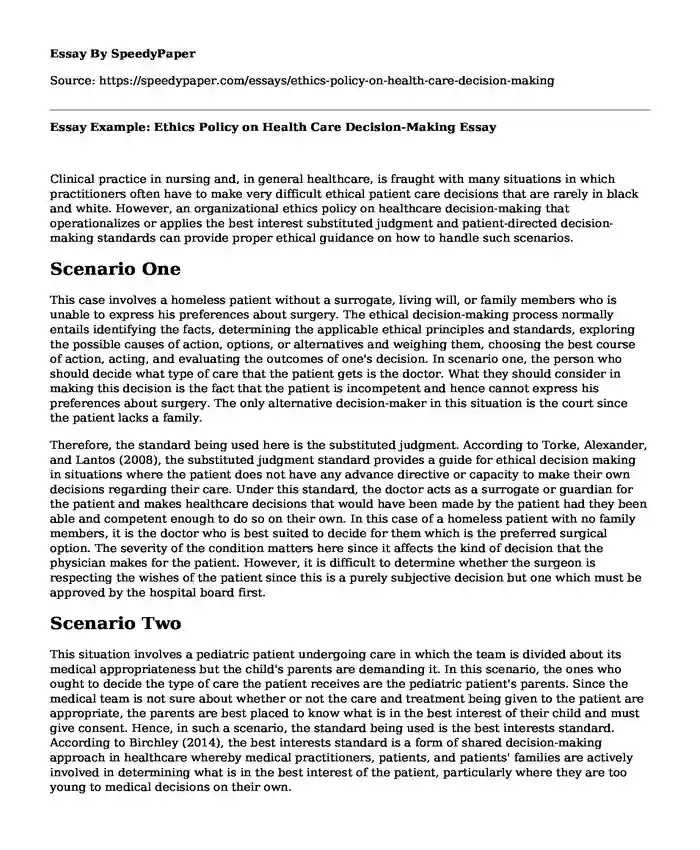
| Type of paper: | Course work |
| Categories: | Nursing Ethics Healthcare |
| Pages: | 3 |
| Wordcount: | 752 words |
Clinical practice in nursing and, in general healthcare, is fraught with many situations in which practitioners often have to make very difficult ethical patient care decisions that are rarely in black and white. However, an organizational ethics policy on healthcare decision-making that operationalizes or applies the best interest substituted judgment and patient-directed decision-making standards can provide proper ethical guidance on how to handle such scenarios.
Scenario One
This case involves a homeless patient without a surrogate, living will, or family members who is unable to express his preferences about surgery. The ethical decision-making process normally entails identifying the facts, determining the applicable ethical principles and standards, exploring the possible causes of action, options, or alternatives and weighing them, choosing the best course of action, acting, and evaluating the outcomes of one's decision. In scenario one, the person who should decide what type of care that the patient gets is the doctor. What they should consider in making this decision is the fact that the patient is incompetent and hence cannot express his preferences about surgery. The only alternative decision-maker in this situation is the court since the patient lacks a family.
Therefore, the standard being used here is the substituted judgment. According to Torke, Alexander, and Lantos (2008), the substituted judgment standard provides a guide for ethical decision making in situations where the patient does not have any advance directive or capacity to make their own decisions regarding their care. Under this standard, the doctor acts as a surrogate or guardian for the patient and makes healthcare decisions that would have been made by the patient had they been able and competent enough to do so on their own. In this case of a homeless patient with no family members, it is the doctor who is best suited to decide for them which is the preferred surgical option. The severity of the condition matters here since it affects the kind of decision that the physician makes for the patient. However, it is difficult to determine whether the surgeon is respecting the wishes of the patient since this is a purely subjective decision but one which must be approved by the hospital board first.
Scenario Two
This situation involves a pediatric patient undergoing care in which the team is divided about its medical appropriateness but the child's parents are demanding it. In this scenario, the ones who ought to decide the type of care the patient receives are the pediatric patient's parents. Since the medical team is not sure about whether or not the care and treatment being given to the patient are appropriate, the parents are best placed to know what is in the best interest of their child and must give consent. Hence, in such a scenario, the standard being used is the best interests standard. According to Birchley (2014), the best interests standard is a form of shared decision-making approach in healthcare whereby medical practitioners, patients, and patients' families are actively involved in determining what is in the best interest of the patient, particularly where they are too young to medical decisions on their own.
Hence, best interest is not a unilateral decision but a joint one whereby doctors and parents determine what is good for a minor. In this case, the parents of the pediatric patient know what is in the best interest of their child and should make decide the care he or she gets. Patient autonomy and informed consent should also be considered in the decision-making process. The length of recovery and the severity of the conditioned matter here since the help shape the decision to be made about the patient's care. Moreover, since the best interests standard is an objective one, there are limits in terms of whether we can know that the wishes of the patient are being respected.
To summarize, in both of the above scenarios, doctors are presented with difficult situations whereby they have to make decisions on behalf of patients while upholding their primary ethical responsibility of promoting the welfare, health, and safety of their patients. The substituted and best interest standards provide useful ethical guidance for making the right decisions on behalf of patients and involving their families in healthcare decision-making.
References
Birchley, G. (2016). Deciding Together? Best interests and shared decision-making inpediatric intensive care. Healthcare Analysis, 22(3), 203-222. doi: [10.1007/s10728-013-0267-y]
Torke, A.M., Alexander, G.C., & Lantos, J. (2008). Substituted judgment: The limitations of autonomy in surrogate decision-making. Journal of General Internal Medicine, 23(9),1514-1517. doi: [10.1007/s11606-008-0688-8]
Cite this page
Essay Example: Ethics Policy on Health Care Decision-Making. (2022, Sep 20). Retrieved from https://speedypaper.com/essays/ethics-policy-on-health-care-decision-making
Request Removal
If you are the original author of this essay and no longer wish to have it published on the SpeedyPaper website, please click below to request its removal:
- IT Admission Essay Sample
- Native Intelligence - Free Essay with an Article Review
- Child Trafficking Essay Example
- Essay Example - The Hunger Artist
- Explanation Essay Example of the Cartoon SJ Ray, Plague of Japanese Beetles, December 1942
- IT Essay Example about the Success of Linux Operating System
- Human Developmental Stages, Free Essay Sample
Popular categories




